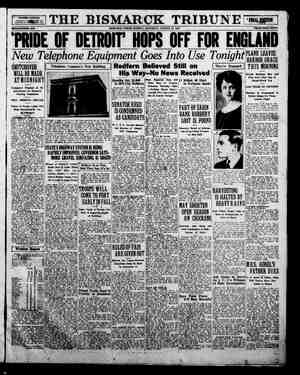The Daily Worker Newspaper, August 27, 1927, Page 7
You have reached the hourly page view limit. Unlock higher limit to our entire archive!
Subscribers enjoy higher page view limit, downloads, and exclusive features.
AGAZINE WORKER SATURDAY,*AUGUST 27, 192 “It’s a Fine per Someone must write a play about Sacco and Van- zetti. This is now one of our great proletarian legends—it is a perfect epic of the new America. I suggest Governor Fuller as the villain of the piece. Capitalism is the real villain, the impersonal profit machine,—Capitalism, punishing its two rebels. But on the stage one must have flesh and blood —not abstractions, Governor Fuller will do as a perfect symbol of capitalism in this great play yet to be written. It is the day of the execution. The morning sur glitters on the dirty gold dome of the State House in Boston. It is a hot stifling day, a day~ of swamp mists and heavy breathing. A hundred thousand clerks clatter meekly to work, sweating under their straw hats. The cops suffer in their blue woolen suits and choker collars. It’s a fine day for swim- ming, but the Governor comes to the State House at 10 o’clock. He greets the newspaper boys with his usual wholesome smile. They immediately write for the first editions: “The Governor looked rested, as if he had had a good night’s sleep. His eyes were clear and friend- ly, his rosy face beamed. It’s a fime morning, isn’t it, he said to the newspapermen. I’ll be here at my Justice For Labor In Massachusetts : like himself from ked streets of Boston the mobs about their desk until m He is a tall, handso the strong face of a Romar magnifico of the New Ameri hard-boiled, genial, ignorant typé¢ ing inthis country. He v this Governor; then he ownex then, when automobiles came enough to take to selling th: now he has about 13 eillion and firmly believes in a chant Must S$, cor wor Van anar: and aren’t they worries, must die a? But the city every; doesn’t worry. He is genial as trick ushered in. He takes the of- Massachusetts liberal woman poet timidly tries to con- He enters his office. Four that ital punishment is both wi { men take chairs about him. » puts her thro a cool-smiling faces and gimlet eyes of detec a litle higher than that in the Governor’s political adv They are here to help him for which he gave up a j{ beach. All day « i with the Governo zetti. she know about criminals’? flounders and te The Governor mile: isers”; they smile at Ai iabo or delegation from New York arr ; ing leaders in the neadle trades 0 call a protest sie e ag sers. him. They ho re- GO nis cut inst the ex vith the “ution, Gover Before ev i -anken or that A. F. of L. x can ut ter a sound, king with questions. > and Vannetti were inno- know Judge Thayer was prejt present at the trial? Do “hey chusetts ? They try to put in a few but this irritates the Governor, ue to offend him—it may prejudice believe there are stirrings of mercy in the chill m ibeee s heart. Two clubwomen arriyz from Newport, R. I., women with impertant husbands. They are pink liberals, and they think the poor Italians should be given an- other chance, or at least life imprisonment, and they have had bape and dinners with the Governor’s wife in the past, and they know Mr. Fuller is a good man. He Lolews to them, assures them politely he will ponder and pray over their fluttering words, and bows them out They are rather confused, but hopeful. * + * Whitefaced m liberats with big names troop in ail They have followed this case, and og the last minute will not believe the fair name of Ame ica is to be sullied by the execution of eae and Vanzetti. They believe in the pure white ab they call “Justice.” They are one need only present the “facts” to the Governor. They believe They believe that there are no classes or class Watgin America, but that this case is sim- ply a miscarriage of “Sy stice.” Now they are humping head first against the stone wall of the capitalist dictatorship and class ei They y are puzzled, alarmed, sickened by the Governor’s smooth determination. They repeat whole pages “of the “Nation” and the “New Republic” at him. They utter the thousand and one phrases dear to liberalism, but the Governor sheds them like a duck’s back, and he politely teases the liberals. He is a realist, this governor; he is class-conscious, he despises liberals, But he is always polite. They stagger out into the street, their world shattered. Liberal phrases do not soften a class- conscious Governor’s heart. They can’t under it at all, And the Governor is smiling at his visers” and they are smiling at him, rom every corner of the world thousands of tel- agrams poured in on the Governor. They were last- minute, desperate messages from mayors, congress- men, labor organizations, churches, writers, Jap- anese, French, Italian, American, African. A whole world was pleading for mercy to two innocent men. It was the biggest event in recent history—this first international protest on a labor issue. The telegrams-~ arrived, but the ne yspapermen told their friends later something that they had not the courage to print, namely :—. That These Telegrams Were Never Read! They were tossed into huge wastebaskets, then taken away and burned by the janitor. were on the floor, , day. action sure in “reason.” and They they were in the corners, they were cynically walked upon by the class-conscious Governor of Massachusetts—the electric-chair Gov- ermo By Fred Ellis (Continued on Page Two)




